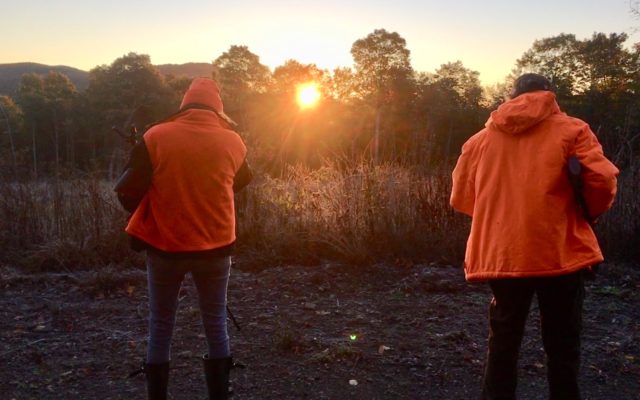
Warm weather may make next week’s moose season a challenge
Hundreds of eager moose hunters will head afield on Monday morning for the first six-day session of the year, and the state’s moose biologist said weather reports aren’t looking particularly favorable for them.
“Right now, it looks like it’s going to be on the warm side,” Lee Kantar of the Maine Department of Inland Fisheries and Wildlife said. “Clearly the last few years have demonstrated that if it’s warm out, it causes problems.”
Among those complications: Warm weather may cause the burly moose to be less active than they would be on a cool day, and after a moose has been shot, the hunter will have to take steps to get the animal cooled down and to a butcher as quickly as possible to avoid spoiling the meat.
“The bottom line is, it’ll be warm out and there’s the possibility that moose will stay in cover more, even though it’s going to be right on top of the rut [or breeding season],” Kantar said. “And once the moose is down, people are up against the time clock for making sure they can preserve and maintain the best quality of meat there is out there.”
Maine’s modern moose hunt was reinstated in 1980 on an experimental basis. After a one-year hiatus, the hunt resumed in 1982 and has been held annually since then. This year a total of 2,820 moose permits were allotted to hunters who entered the permit lottery.
According to the National Weather Service, Monday’s high temperature in Caribou is expected to be 72 degrees. Kantar said that DIF&W staffers have sent out emails to prospective hunters warning them about the forecast, and advising them to plan accordingly.
Kantar is hoping more hunters will abandon the traditional method of transporting a whole moose back to the tagging station, and will instead choose to quarter the moose in the field. That method — removing the hide and cutting the moose into four pieces — will allow the meat to cool more quickly, and is quite simple. The DIF&W even has an on-line video that demonstrates the method.
“Just because you’ve done things the same, that doesn’t mean you can’t change,” Kantar said. “There’s a phenomenon out there that some people think you’ve got to take the whole moose out. And they don’t.”
Kantar said first-time moose hunters who want to learn how to field dress a moose can also find a DIF&W tutorial video that will help. And he wanted to remind hunters during the late-October cow season that biologists will be collecting moose ovaries at the tagging station. A video is available on the DIF&W website to help hunters fulfill that responsibility as well.
As the first six-day moose season winds down, bird hunters will take to the woods on Sept. 28. Typically, bird hunters get a week of solitude before moose hunters return for a week in October. This year, a calendar anomaly has created a two-week gap before the next moose session begins on Oct. 14.
Hunters during that season will likely face different challenges, Kantar said. But after this year, the two-week gap between moose seasons will be eliminated because the DIF&W has made the one-week gap the standard going forward.
“There’s definitely some truism to the fact that bulls may not be as receptive or willing to come to a call [in mid-October],” Kantar said. “But hey, you know, if you’re out there and a bull calls, and you hear it, you can kind of locate it. So then, you have to be stalking and acting more like a deer hunter.”
Kantar said that he always looks forward to the arrival of moose season.
“It’s an exciting time. I mean, the red maples and the swamps are starting to change [colors]. Vegetation is starting to die back,” Kantar said. “Fall is in the air, even if it’s going to be a little warm next week.”
This year’s moose-hunting sessions:
— Sept. 23-28, with 850 bull permits in 11 Wildlife Management Districts.
— Oct. 14-19 with 1,280 bull permits in 18 WMDs.
— Oct. 28-Nov. 2 with 650 cow permits in 6 WMDs.
— Nov. 4-30 (including Nov. 2 for Maine residents) with 40 any-moose permits in 2 WMDs.
The permits are allotted by a state-run lottery. Once selected, the lucky hunters are required to purchase a moose hunting permit. Maine residents pay $52 for the permit, while non-residents pay $585. They must also purchase a Maine big game hunting license ($26 for residents, $115 for non-residents).